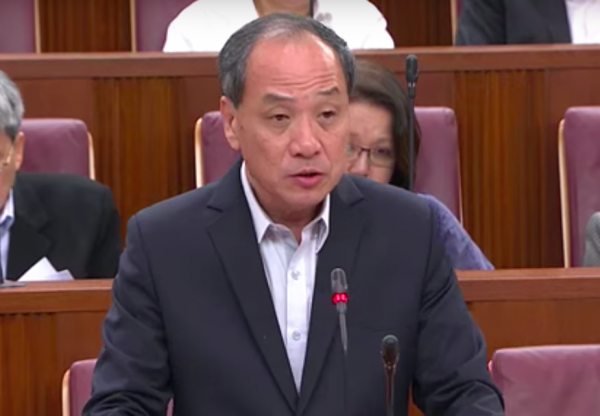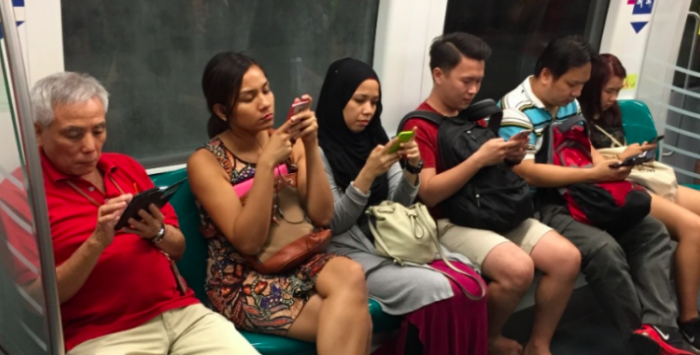On Jan. 5, the Ministry of Law announced that the Government will ask Parliament to appoint a Select Committee.
This Committee will be tasked with studying the problem of "deliberate online falsehoods", and make recommendations on how Singapore should respond.
Minister for Law and Minister for Home Affairs K. Shanmugam will move the motion during the Parliament sitting on Jan. 10 to appoint the Select Committee.
What's a Select Committee?
Select Committees are committees of MPs created by Parliament for various purposes.
For policy issues
Parliament can appoint a Select Committee to examine a policy issue, like the Select Committee on Land Transportation Policy, which presented its report to Parliament in Jan. 1990.
That report happens to be the reason why the vehicle quota and COE system was introduced.
For considering a Bill
Parliament can also send a Bill to be considered by a Select Committee after it has received a Second Reading.
On Nov. 6, 2017, 2nd Minister for Transport Ng Chee Meng announced that the Cross-Border Railways Bill will be referred to a Select Committee. When passed, the Bill will govern two future links between Singapore and Malaysia, the High Speed Rail and the Rapid Transit System.
[related_story]
Standing Select Committees
Then there are the Standing Select Committees, which are appointed for the duration of a term of Parliament to undertake various functions. There are seven in all, and their functions are described below:
- COMMITTEE OF SELECTION:
It selects and nominates members to the various sessional and select committees.
- COMMITTEE OF PRIVILEGES
It looks into any complaint alleging breaches of parliamentary privilege.
- ESTIMATES COMMITTEE
It examines the Government's budget and reports what economies, improvements in organisation, efficiency or administrative reforms consistent with the policy underlying the estimates, may be effected and suggests the form in which the estimates shall be presented to Parliament.
- HOUSE COMMITTEE
It looks after the comfort and convenience of Members of Parliament and advises the Speaker on these matters.
- PUBLIC ACCOUNTS COMMITTEE
It examines various accounts of the Government showing the appropriation of funds granted by Parliament to meet public expenditure, as well as other accounts laid before Parliament.
- PUBLIC PETITIONS COMMITTEE
It deals with public petitions received by the House. Its function is to consider petitions referred to the Committee and to report to the House.
- STANDING ORDERS COMMITTEE
It reviews the Standing Orders from time to time and recommends amendments and reports to the House on all matters relating to them.
Choose your Members
So who's going to join this Select Committee? According to the Ministry of Law:
"The composition of a Select Committee reflects the balance between the Government and Opposition benches in Parliament."
According to Shanmugam's Notice of Motion, the Select Committee shall comprise:
- Deputy Speaker of Parliament Charles Chong as Chairman.
- Seven MPs from the Government benches (PAP).
- One MP from the Opposition benches (WP).
- One NMP, who will be nominated by the Committee of Selection (see above).
That's enough for two basketball teams. Maybe they can shoot a few hoops in between their committee work.
Incidentally, former MP Chiam See Tong was part of the Committee on Land Transportation Policy in 1990, while current WP MP Low Thia Khiang is on the Select Committee looking at the Cross-Borders Railways Bill.
 Screen shot from Gov.sg YouTube channel.
Screen shot from Gov.sg YouTube channel.
How does the Committee work?
The public will be invited to make Submissions to the Committee, once it has been formed. This is your opportunity to complain make meaningful suggestions and share your own views.
The Committee can also hold public hearings to get more information from contributors, like industry experts.
After it completes its work, the Committee will present its report to Parliament. This report will set out:
- Any evidence received by the Select Committee.
- The Committee's decisions (if any).
- The Committee's recommendations.
Reports presented are publicly available. You can read previous reports for yourself at this link.
Why should you care?
The real question. It all sounds terribly dry, but here's why you really should pay attention.
I'm willing to bet that a majority of you are reading this on your phone or your computer right now.
Singapore is a highly connected nation. 91 per cent of Singapore households and 84 per cent of Singaporeans have Internet access.
Over half of Singaporeans obtain their news sources online, including through social media.
 Pic from Campus Eye/Mishaal Nadiah.
Pic from Campus Eye/Mishaal Nadiah.
With the formation of a Select Committee, the Government shows that it takes the issue of "deliberate online falsehoods" with utmost seriousness.
Its recommendations might change the way you read the news, obtain information, or share news articles with others.
This is your only chance to get involved in the process that will almost certainly transform your life.
Top image from PM Lee Hsien Loong's Facebook page.
If you like what you read, follow us on Facebook, Instagram, Twitter and Telegram to get the latest updates.
